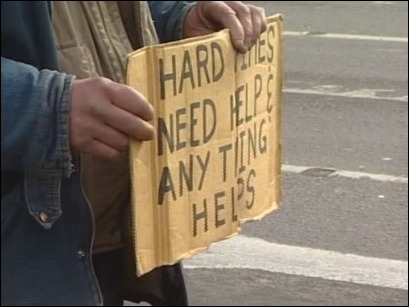Panhandling bylaw would further marginalize poor people in Nelson: Nelson Committee on Homelessness
The proposed panhandling bylaw does a disservice to a segment of Nelson’s society, and further marginalizes the poor in the city, said the Nelson Committee on Homelessness.
Committee member Ann Harvey and two other Nelson Committee on Homelessness board members said city council’s draft legislation on panhandling will not solve the underlying problem of poverty in the city, and they spoke out in opposition of the bylaw Monday night at the committee of the whole meeting.
The issue in Nelson is that people are poor, said Harvey. Many people on the street in Nelson cannot afford to buy food and pay their rent, and they turn to panhandling to make ends meet.
“People do not panhandle because they want to; they do so because they have to and need to,” said Harvey.
Levying penalties from bylaw infractions that poor people cannot pay would create more of a problem, said Harvey.
“To issue a ticket to someone who is trying to raise money for food is counter intuitive,” she said. “We would only be creating further burden and need.”
If the bylaw were needed to address aggressive street behaviour, Harvey continued, the Safe Streets Act already covered the concern. Aggressive street behaviour is a policing issue and a mental health issue, she added.
“Downloading this to bylaw officers is not appropriate,” she said. “The likely outcome of this will be escalated violence and, ultimately, police intervention. Bylaw officers are not equipped to deal with aggression. This should not be their job.”
Four other people spoke Monday night as council threw open the issue for public input.
Will Evans, formerly of Chilliwack, delivered a warning to council: not to become like the Lower Mainland city.
“I don’t want to see what happened to Chilliwack years ago, happen to Nelson,” he said. “The first sign of the downturn (of the downtown) was the appearance of aggressive panhandlers. Panhandling, in my mind, is a deterioration.”
He urged council to draft legislation that would make it tougher to beg and panhandle.
One woman agreed.
“This is going to spread,” she said about panhandling. “I understand that some people need this money. But aren’t there other ways to help people than giving them permission to beg? It just breaks my heart that this is happening in Nelson.”
Another man questioned council as to where it was documented that the issue of panhandling was raised and put forward by police.
“If they didn’t do it, who initiated this flimsy, waste of time?” he asked.
The City of Nelson’s Panhandling bylaw is currently at second reading. After council’s meeting on Oct. 26 the bylaw was circulated to the following community groups for review: Nelson Committee on Homelessness; Nelson and District Chamber of Commerce; Nelson Business Association; Senior’s Coordinating Society; and Senior Citizen’s Association.
Most of the groups solicited were in favour of some sort of legislation to deal with panhandling.
The chamber board of directors adopted a resolution in favour of passing an “aggressive panhandling” bylaw that would regulate behaviour — and also where the panhandling could take place — but not make it illegal.
The chamber board understood that, for some, panhandling was a way of life and an unfortunate circumstance of life, said chamber president Ed Olthof in a letter to council.
“There is also a realization that for some Nelson residents and business owners, the location of where the panhandling occurs can be problematic to their business, or to their individual or family comfort level of shopping downtown,” he said.
The chamber also conducted a survey of downtown member businesses. While the sample size was not large, Olthof noted, 81 per cent of the 22 respondents “were clearly in favour of moving forward with the development of a panhandling bylaw.”
The Senior’s Coordinating Society board did not see the issue of inappropriate or aggressive panhandlers being a senior’s issue.
“It affects us in the same way it affects everyone else,” wrote board chair Brad Howard in a letter to council. “However, as a generalization, seniors react more passively, defensively and are less likely to confront. We simply will move away or avoid.”
So the negative effects are businesses lose customers, and sidewalks and known panhandler areas (sidewalks) will be avoided.
Howard said society members did identify problems with panhandlers near cash machines when people were getting money, as well as panhandlers near doorways, grocery stores, etc. when people were going in or out.
“We are not clear on how a bylaw will change or improve a situation,” Howard said. “Specific problems come down to various locations and specific individuals.”
There were no complaints with the wording of the draft bylaw, according to the Senior Citizen’s Association.
“Here at Seniors Branch 51 we feel the panhandler bylaw has covered all bases and are happy with it,” wrote Mildred Anderson, president of the branch.
























